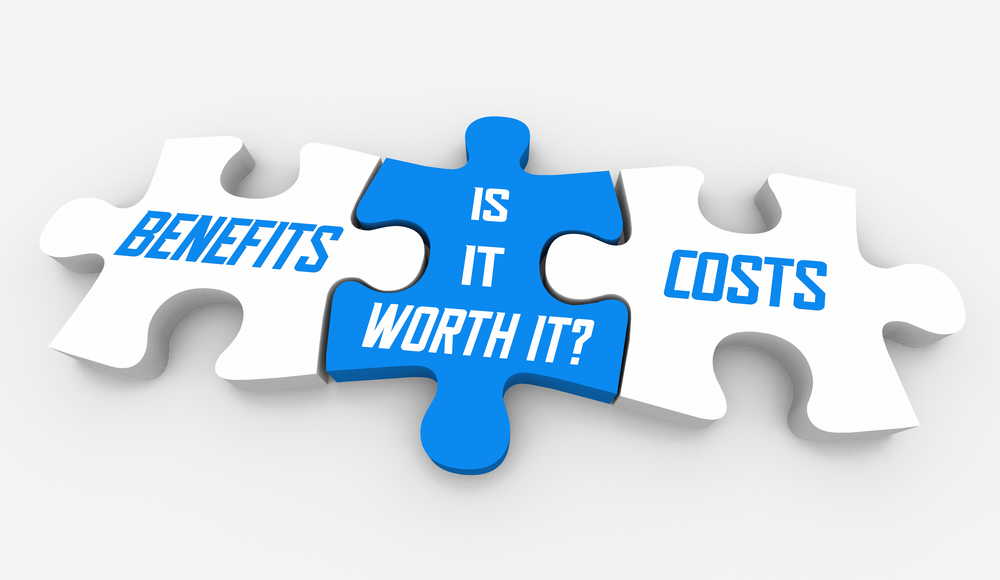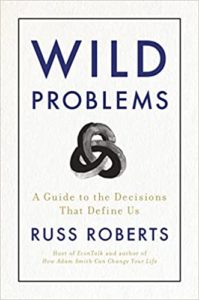When Cost-Benefit Analysis Fails
By Arnold Kling


- Whether to have a child is what I call a wild problem—a fork in the road of life where knowing which path is the right one isn’t obvious, where the pleasure and pain from choosing one path over another are ultimately hidden from us, where the path we choose defines who we are and who we might become. Wild problems are the big decisions all of us have to deal with as we go through life.
- —Russ Roberts, Wild Problems: A Guide to the Decisions that Define Us,1 p. 2
Russ Roberts spent most of his career as an economist. Accordingly, you might expect Wild Problems to include a lot of the methods of economics: choices based on costs and benefits; risk-reward trade-offs; data-driven analysis and statistical modeling.
But Roberts deliberately discards the standard economic tool kit for dealing with these problems. He explains,
- In most areas of life, especially the important ones, our desires aren’t fixed in the way economists usually think of them. Many of our desires are in conflict. We all have urges that we long to indulge and sometimes these urges sit uneasily with us. Sometimes we long to limit our urges, whether food, sex, money, or the app on your phone that you spend time with compulsively. We have a good dog and a bad one fighting each other all the time. Feed the good dog. p. 156
It struck me in reading the book that many of the wild problems Roberts describes are in our intimate world. That is, they involve friends, loved ones, and co-workers. In contrast, many of the problems that economists like to work on are in our remote world. That is, they involve allocation of resources by business executives, policy makers, and markets. These decisions mostly affect people who are not known to the decision-maker.
To give advice in the remote world, economists attempt to calculate the best decision given the trade-offs involved. For example, the economist can attempt to determine the optimal policy to reduce carbon emissions. These calculations assume, either explicitly or implicitly, that the people affected by the decision can be represented abstractly as a “typical agent.”
In making decisions in the intimate world, Roberts cautions, we cannot assume that everyone is typical.
- But will it be good for you—the actual you and not some average experienced by others—a flesh-and-blood human being who will live the experience in real time? p. 25
For example, suppose you read about a survey that shows that people aged 30-40 without children are on average happier than people that age with children. Does that tell you not to have children?
First, you have no idea how respondents interpreted the survey. Were they asked to blurt out a number between 1 and 7 to describe their general happiness at that moment? Or were they asked to reflect on how their specific decision to have children or not affected their happiness?
Second, you do not know whether their reasons for feeling happy or unhappy would apply in your instance. A couple might have decided not to have children because they prefer to be able to go skiing often. You might have different priorities. You may not even know how to ski.
Finally, you do not know how people will feel later in life. Suppose that a different survey finds that grandparents are much happier than elderly people who don’t have grandchildren. What does that tell you about the decision to have children?
For more on these topics, see
- Adam Smith. Biography. Concise Encyclopedia of Economics
- The Theory of Moral Sentiments Reading Guide. AdamSmithWorks.org.
 Dan Klein on The Theory of Moral Sentiments, Episode 1–An Overview. EconTalk. Part of 6-part series on Adam Smith’s The Theory of Moral Sentiments
Dan Klein on The Theory of Moral Sentiments, Episode 1–An Overview. EconTalk. Part of 6-part series on Adam Smith’s The Theory of Moral Sentiments
What this illustrates is that there is a difference between momentary happiness and what Roberts calls flourishing. He writes,
- The economist and moral philosopher Adam Smith thought that flourishing, and the contentment it produces, is trickier than it looks. In his little-known master piece The Theory of Moral Sentiments, he wrote that “man naturally desires, not only to be loved, but to be lovely.” By “loved,” he meant not just cared about but praised, appreciated, admired, and respected. We want to matter. And by “lovely,” Smith meant worthy of praise, appreciation, admiration and respect…
- Smith observed that there are two ways to matter—two ways to earn the praise, appreciation, admiration and respect of people. One way is to be rich, powerful, and famous. The other is to be wise and virtuous. p. 86
For more on these topics, see
 Russ Roberts and Mike Munger on Wild Problems. EconTalk.
Russ Roberts and Mike Munger on Wild Problems. EconTalk.- “Wild Problems: Homebuying Edition,” by Kevin Corcoran. EconLog, August 22, 2022.
Roberts emphasizes that wisdom and virtue are most evident in the intimate world. It shows up not in our politics but in the way we treat people with whom we come into personal contact. He writes,
- The rule is simple: Privilege your principles.
- Your decisions define who you are. Don’t make trade-offs when it comes to your essence. Live with integrity. Do the right thing and respect yourself. p. 145
- Wild Problems by Russ Roberts, 9/2022. YouTube.
All of us face choices of the type that Roberts calls “wild problems.” Reading his book will help remind you to step back from your smart phone and your immediate urges and instead follow your conscience when you come across these situations.
Footnotes
[1] Russ Roberts, Wild Problems: A Guide to the Decisions that Define Us. Portfolio, 2022 Available at Amazon.com.
*Arnold Kling has a Ph.D. in economics from the Massachusetts Institute of Technology. He is the author of several books, including Crisis of Abundance: Rethinking How We Pay for Health Care; Invisible Wealth: The Hidden Story of How Markets Work; Unchecked and Unbalanced: How the Discrepancy Between Knowledge and Power Caused the Financial Crisis and Threatens Democracy; and Specialization and Trade: A Re-introduction to Economics. He contributed to EconLog from January 2003 through August 2012.
Read more of what Arnold Kling’s been reading. For more book reviews and articles by Arnold Kling, see the Archive.
